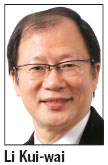Keep politics out of economics
Updated: 2013-05-21 06:59
By Li Kui-wai(HK Edition)
|
|||||||

To politicize economic issues, or to take advantage of economic problems for political ends, is a no-win approach, as it will undermine the economic success of Hong Kong.
Politicians are opportunists, and look for instruments for their political ends. This is true all over the world. Unfortunately, some politicians in Hong Kong also take such an attitude. Political goals tend to be short term, as politicians seek votes and greater popularity, but economic issues are long term. Such issues become distorted when politicians try to squeeze long-term economic issues into short-term issues, hoping to produce short-term results. The reason many economies are suffering globally is because economic issues have been used as political instruments for political ends, thereby sacrificing the long-term benefit of all.
There is a vicious political-economic cycle. Politicians create economic distortion or even failure by their actions, and such results are then further exploited by politicians for more political ends. Resulting economic distortions then force more politicians to use the economy as an instrument for their political ends. Such a vicious cycle is common in many failed states where economic stability could not be restored, and one form of instability breeds another form of instability.
If one looks at countries such as Greece and Cyprus, their economic failure has been due to the massive and unsustainable welfare state where growth isn't sufficient to fund welfare payments. One has to understand the cause and consequence of these medium-sized European countries, and why they are so debt-prone now. After World War II, most European countries enjoyed substantial growth. When their economy was booming, welfare expenditure was enlarged and the state was faced with increasing fiscal responsibilities. However, once given, welfare expenditure could not be withdrawn. Thus, welfare expenditure kept rising, and funding was possible only when there was sufficient growth.
However, many of these medium-sized European countries soon reached their economic capacity, and further growth was limited. While welfare expenditure was rising, growth was not. Economic recession made it difficult to fund welfare, and the answer was to issue government debt. Debts mean this generation has used the economic resources of the next generation. The worst is to use debts to cover previous debts, and there comes a time when the economy is no longer able to raise debts.
There is a lesson for the Hong Kong economy. Growth fluctuates, but welfare expenditure is fixed. What we can afford today we may not be able to in future. Our fiscal ability has to be more cautious and prudent. On the other hand, in Hong Kong we do have a comprehensive welfare system that is meant to help the needy without discrimination. All economically needy individuals and families have the right to approach the government for help. What one must do is avoid multiple or even duplicate layers of welfare provision.
That is easier said than done through the provision of a blanket retirement fund. Such a move is a risk as it may introduce rigidity to our fiscal expenditure in an unstable and fluctuating economy. Hong Kong excels because we do not have a heavy welfare burden, and businesses and private activities have taken the lead.
The Hong Kong economy has faced a number of difficulties, but would the introduction of a blanket retirement provision be a solution or a burden? Economic difficulties need genuine, long-term, effective solutions, not a solution that simultaneously creates another problem. Government expenditure in the form of welfare cannot be growth-promoting because all it does is raise people's nominal consumption. Hong Kong's success has been based on job creation, career promotion and rising productivity and wages.
Hong Kong cannot transform into a welfare economy, because the small economy cannot afford to provide mass rigid welfare payments. We cannot give fish, but can teach people how to fish. It is preferable to keep economic issues in Hong Kong apolitical, and politicians should concentrate their energy on political issues, and avoid politics spilling onto economics.
It is always popular for politicians to publicize their intention to help the poor, the weak and the elderly. But it is just political psychology when politicians claim the government should provide aid to needy individuals. Assistance should be given when needed, but blanket coverage may lead to abuse of resources. The elderly need help, but not all elderly people are poor and financially weak. We can economically assist but should not intervene. We should spend but be effective and smart. We have fiscal surpluses, but fiscal prudence is what we have. It is easier to say that government should spend more when we have such a huge surplus, but who would take the responsibility if crises strike and fiscal deficits were to resurface? Who would rescue a crisis-prone and debt-prone Hong Kong?
Despite the various calls for more government intervention, much of it is political gesturing. It would not be easy for Hong Kong to introduce a mass welfare economy without destroying the foundation of the city's economic success. Are we prepared to take that risk and bear the responsibility? Politicians may have gained political popularity through the filibuster and may even return in their next election, but we should not allow political opportunists to exploit the local economy and hold our economic future to ransom. Politicians are welcome to perform their best in Hong Kong's political arena, but look for economic solutions for economic problems.
The author is associate professor with the Department of Economics and Finance at City University of Hong Kong.
(HK Edition 05/21/2013 page1)